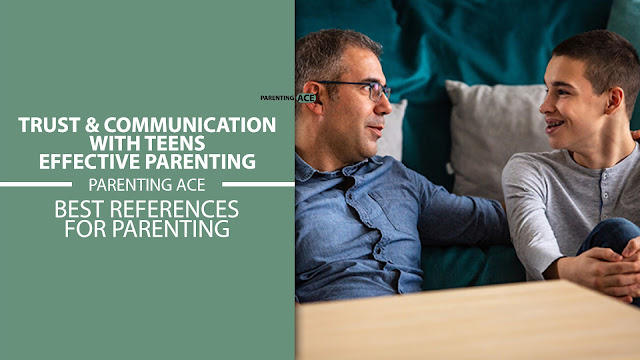Building Trust and Communication with Teenagers: Effective Strategies for Parents
Establishing trust and effective communication with teenagers is a pivotal aspect of parenting during their formative years. As adolescents navigate the complexities of identity, autonomy, and peer relationships, fostering a strong parent-teen bond becomes paramount. In this blog post, we delve into practical strategies and psychological insights to help parents navigate this dynamic phase, laying the groundwork for healthy relationships and positive developmental outcomes.
 |
| Trust & Communication with Teens: Effective Parenting |
What Are Some Effective Ways To Build Trust And Communication With Teenagers?
Navigating the complexities of parent-teen relationships can be challenging, yet crucial for fostering healthy development and well-being in adolescents. Trust and communication serve as the cornerstone of these relationships, laying the groundwork for mutual understanding, respect, and support. In this article, we explore effective ways for parents to build trust and communication with their teenagers, drawing from psychological insights and practical strategies.
Understanding the Teenage Mind
Before delving into strategies, it's essential to understand the unique characteristics of the teenage mind. Adolescence is a period marked by significant physical, emotional, and cognitive changes. Teenagers are exploring their identities, seeking autonomy, and grappling with heightened emotions and peer influences. Recognizing these developmental dynamics can help parents approach communication with empathy and understanding.
1. Listen Actively
One of the most powerful ways to build trust and communication with teenagers is by actively listening to them. This means giving them your full attention without judgment, interruption, or preconceived notions. Create a safe space where they feel comfortable expressing their thoughts, feelings, and concerns. Validate their experiences and emotions, even if you don't necessarily agree with them. Active listening fosters trust and strengthens the parent-teen bond.
2. Respect Their Autonomy
Teenagers crave independence and autonomy as they strive to assert their identities. Respecting their autonomy doesn't mean relinquishing parental authority but rather involving them in decision-making processes and respecting their choices within reasonable boundaries. Empower them to make age-appropriate decisions, and offer guidance rather than imposing mandates. When teenagers feel respected and trusted, they are more likely to reciprocate these sentiments.
3. Be Transparent and Honest
Trust is built on honesty and transparency. Be open with your teenagers about your own experiences, values, and expectations. Share your thoughts and feelings genuinely, and admit when you've made mistakes. Avoiding deception or manipulation, even in difficult situations, demonstrates integrity and cultivates trust. Teenagers are adept at detecting falsehoods, so it's essential to maintain honesty in all interactions.
4. Set Clear and Reasonable Boundaries
While respecting their autonomy, it's crucial to establish clear and reasonable boundaries to provide structure and guidance. Clearly communicate your expectations regarding behavior, responsibilities, and consequences. Involve teenagers in the process of setting boundaries, allowing them to have input and understanding the rationale behind rules. Consistency and fairness in enforcing boundaries reinforce trust and promote mutual respect.
5. Foster Quality Time Together
Quality time spent together strengthens parent-teen relationships and facilitates open communication. Engage in activities that your teenager enjoys, whether it's playing sports, watching movies, or simply having meaningful conversations. Create regular opportunities for bonding and connection, free from distractions like phones or other devices. These shared experiences build positive memories and deepen the parent-teen bond.
Building trust and communication with teenagers is a gradual process that requires patience, empathy, and active effort. By listening actively, respecting autonomy, fostering honesty, setting clear boundaries, and spending quality time together, parents can nurture strong, healthy relationships with their teenagers. These strategies not only enhance parent-teen relationships but also support adolescents' emotional well-being and development. Remember, building trust and communication is an ongoing journey that lays the foundation for lifelong connections and mutual understanding.




